In this article:
Jackfruit is the largest tree-borne fruit in the world, and its bright-yellow edible pods are very sweet and juicy. There’s a seed inside each pod, largely composed of starch and protein.
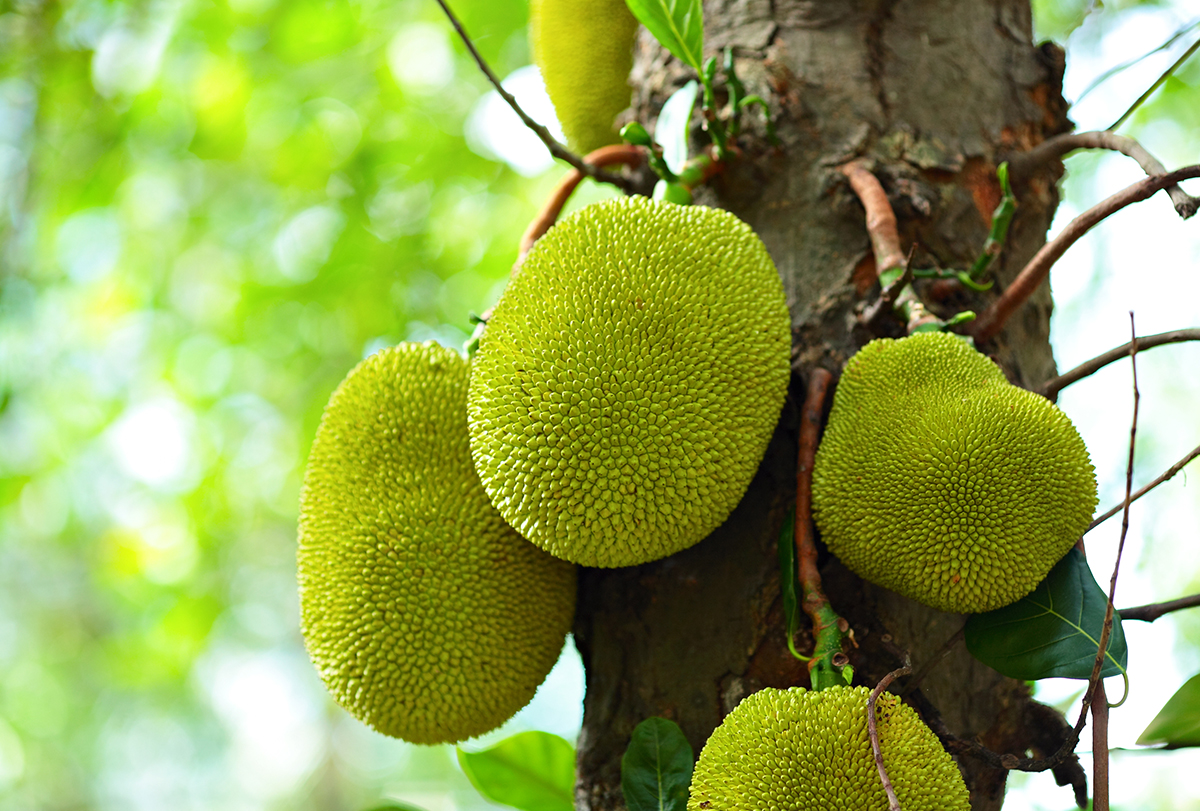
Native to South India, this miracle fruit thrives all through summer and its cultivation has now spread to a number of tropical South-East Asian countries as well.
It is rich in dietary fibers and has a significant amount of flavonoid pigments, such as carotene, xanthine, lutein, and cryptoxanthin. (1)
The easily digestible pods of jackfruit contain simple sugars like fructose and sucrose. In addition, it contains no gluten or casein. For those who relish a good piece of succulent fruit, they would love to dig their teeth into jackfruit as it is made up of 80% water.
Note: Excessive consumption of jackfruit may cause stomach upset, so eat it in moderation. Plus, it may not be suitable for pregnant and breastfeeding women.
Reasons Why Jackfruit Is Good for Your Health
Here are 10 nutritional facts and health benefits of jackfruit.
1. Supports the immune system
Jackfruit is rich in vitamin C (an antioxidant), which supports the functioning of white blood cells. (2) This antioxidant also helps neutralize free radicals in the body, which can damage cell membranes and even DNA. (3)
Thus, a healthy intake of jackfruit can help fortify your immune system, which is vital for resisting viral and bacterial infections including common colds and the flu.
Just 100 g (3.5 oz) of jackfruit provides 13.8 mg or 17% of your daily requirement of vitamin C. (4)
2. Keeps skin healthy
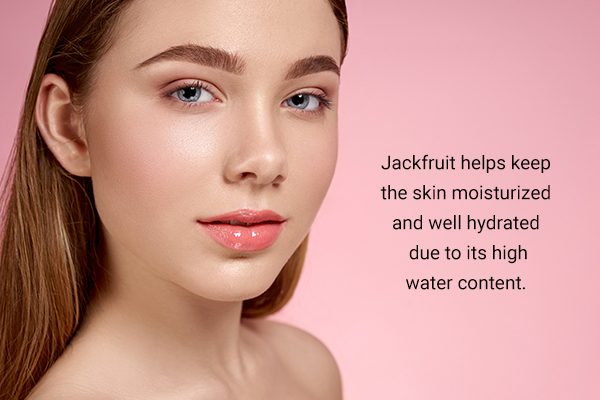
Fretting about premature skin aging will serve no purpose other than augmenting the damage.
What you can do instead is increase your intake of vitamin C-enriched jackfruit. This will provide your body with additional vitamin C, which plays a key role in the synthesis of collagen, a protein that helps keep skin firm and tight, thereby reducing the appearance of wrinkles and fine lines.
Furthermore, its antioxidant content will help scavenge free radicals generated in the skin by ultraviolet rays and other sources. These free radicals wreak havoc on your skin by inducing oxidative stress and expediting the aging process. (5)
In addition, jackfruit helps keep the skin moisturized and well hydrated due to its high water content. Well-hydrated skin tends to glow and look younger.
3. Improves energy level
Jackfruit contains simple sugars such as fructose and sucrose that give your body an instant energy boost. It contains no saturated fat or cholesterol. (4)
It is the ideal energy booster for people with diabetes because the sugar in this fruit is categorized as slowly available sugar (SAG). This essentially means that jackfruit releases sugar in a slow, restrained manner, thereby mitigating the threat of hyperglycemia.
A cup of jackfruit makes a great addition to your diet, especially if you are involved in sports or other activities for which you need to keep your energy level consistently up.
4. Relieves constipation

The dietary fiber in jackfruit helps keep the digestive system working smoothly. This fibrous fruit works as a natural laxative by adding bulk to your stools and softening them up for easy and efficient fecal elimination. Thus, jackfruit helps regulate timely bowel movements and prevent constipation and hemorrhoids.
However, as mentioned above, eating too much jackfruit can prove counterproductive to dispelling your tummy troubles and may end up aggravating stomach unrest. In order to maximize jackfruit’s digestive health benefits, moderate consumption is the key.
5. Lowers high blood pressure and homocysteine
The vitamin C in jackfruit helps scavenge and combat free radicals, which are often at the root of many chronic ailments including heart disease. (6)
In addition, the potassium in it helps regulate blood pressure by modulating the sodium level in the body. Excess sodium can cause a rise in blood pressure, especially in people genetically predisposed to this. (7)
The fruit also contains vitamin B6, which helps reduce homocysteine levels in the blood and may help lower the risk of heart attacks and strokes. (8)
6. Maintains healthy vision
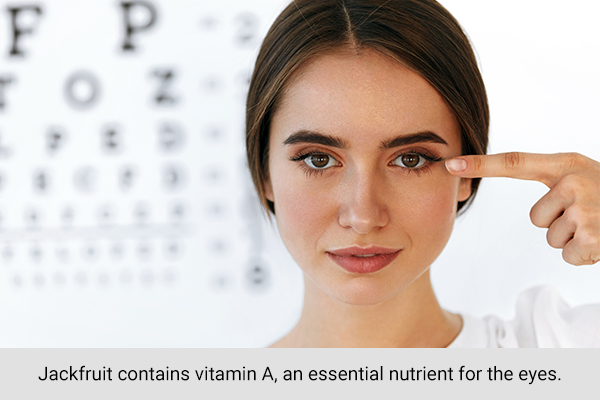
Jackfruit contains vitamin A, (4) an essential nutrient for the eyes. This vitamin is critical to healthy vision and plays a role in preventing cataracts, night blindness, macular degeneration, and glaucoma. (9)
Vitamin A even helps strengthen the mucous membranes which create a film on the cornea that protects the eyes from bacterial and viral infections. (10)
The vitamin C in jackfruit promotes the production and maintenance of healthy capillaries and helps support the proper functioning of retinal cells. It also contains the carotenoids lutein and zeaxanthin, which scavenge free radicals produced by ultraviolet (UV) light and various bodily processes. (11)
7. Strengthens bones
Jackfruit is rich in magnesium, a nutrient that helps in the absorption of calcium. (4) Magnesium and calcium work together to strengthen the bones and prevent bone-related disorders, such as osteoporosis. (12)
In addition, it contains potassium, which prevents the loss of calcium through the kidneys and thereby improves calcium density in bones, especially in post-menopausal older women. (13)
8. Supports thyroid health
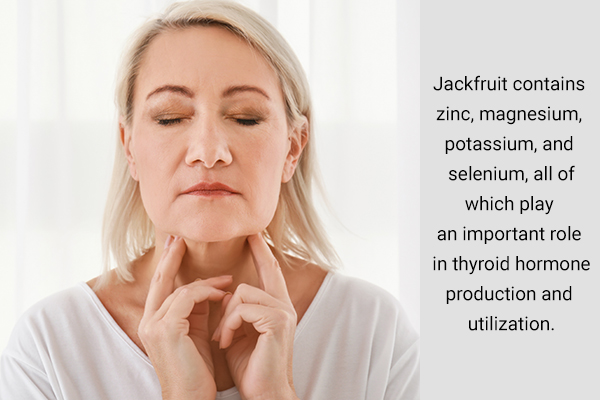
Jackfruit contains zinc, magnesium, potassium, and selenium, all of which play an important role in thyroid hormone production and utilization. (14)
Jackfruit also contains B vitamins, which support healthy thyroid functioning, with B12 being of special interest as many people with primary hypothyroidism have a deficiency of this vitamin and, thus, benefit from dietary and oral supplementation of it. (15)
9. Prevents anemia
Thanks to its iron content, jackfruit can help prevent anemia induced by a red blood cell deficiency. In addition, the vitamin C content in it improves the absorption of iron in the body. Lack of vitamin C in the body can render it incapable of absorbing sufficient dietary iron required for the blood-building process. (16)
Moreover, jackfruit is well endowed with magnesium and copper, both of which assist in the production of blood in the body.
10. Protects against cancer
The vitamin C in jackfruit scavenges free radicals, which can damage cells leading to the development of cancer. (17) It also contains vitamin K, manganese, and dietary fibers, which help lower the risk of some forms of cancer, such as colorectal cancer. (18)
In addition, it contains phytochemicals, including lignans, isoflavones, and saponins, which help combat cancer-causing free radicals in the body. (19)
Nutritional Content of Jackfruit
Enriched with vitamins A, C, and B6, calcium, potassium, iron, folic acid, thiamin, riboflavin, niacin, and magnesium, jackfruit packs quite a healthy punch. (4)
Nutritional value of jackfruit per 100 grams:
- Water – 73.46 g
- Energy – 95 kcal
- Protein – 1.72 g
- Total lipid (fat) – 0.64 g
- Carbohydrate – 23.25 g
- Fiber – 1.5 g
- Sugars – 19.08 g
- Calcium, Ca – 24 mg
- Magnesium, Mg – 29 mg
- Phosphorus, P – 21 mg
- Potassium, K – 448 mg
- Sodium, Na – 2 mg
- Vitamin C – 13.7 mg
- Thiamin – 0.105 mg
- Niacin – 0.920 mg
- Vitamin B-6 – 0.329 mg
- Folate – 24 mcg
- Vitamin A – 5 mcg
Precautions to Consider
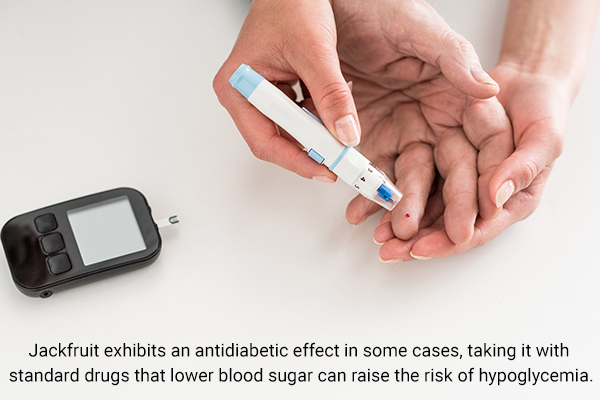
- There isn’t sufficient evidence to attest to the safety of using jackfruit during pregnancy and breastfeeding. Thus, it’s best for women in such vulnerable states to stay on the safe side and avoid its use.
- In some cases, people with active allergies to birch pollen were found to exhibit a similar reaction to jackfruit as well. On account of this cross-sensitization risk, people who are allergic to birch pollen are advised to use jackfruit cautiously.
- Since jackfruit exhibits an antidiabetic effect in some cases, taking it with standard drugs that lower blood sugar can raise the risk of hypoglycemia or excessively low blood sugar in people with diabetes. In order to prevent such disruption of blood sugar control, consult with your doctor to appropriately alter the dose of your diabetes medication.
- Since jackfruit extracts have been found to induce drowsiness. Given this property, jackfruit might compound the effect of general anesthesia or other sedative drugs administered during or after surgery and cause excessive or prolonged drowsiness. It is thus recommended to cease using this fruit at least 2 weeks before a scheduled surgery.
Final Word
Jackfruit is richly endowed with a plethora of nutrients that provide many wonderful health benefits. You can use the ripe fruit to make jam, jelly, ice cream, candies, cakes, and chutneys (spicy sauces), while the pods even make a great addition to fruit salads, smoothies, and healthy snacks.
You can even use raw jackfruit for cooking curries, stews, and other delicious vegetable dishes. Additionally, owing to its meaty texture, jackfruit has gained considerable traction amongst new-age vegans and vegetarians as a nifty meat substitute.
- Was this article helpful?
- YES, THANKS!NOT REALLY


